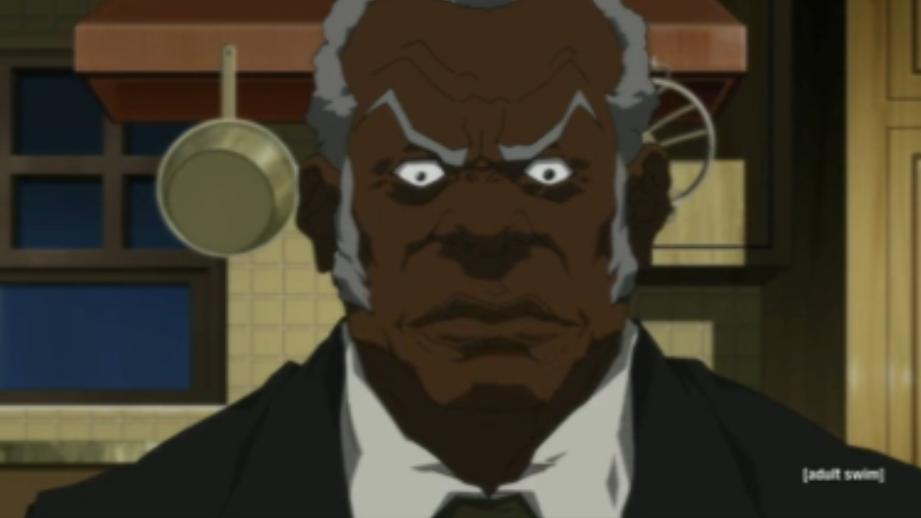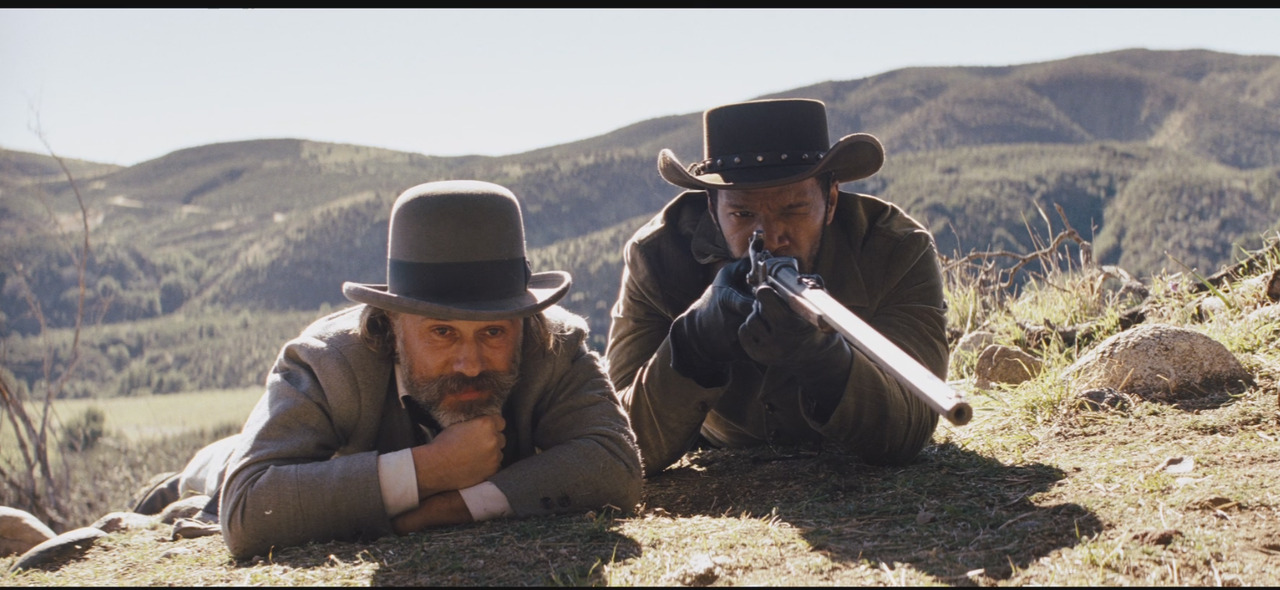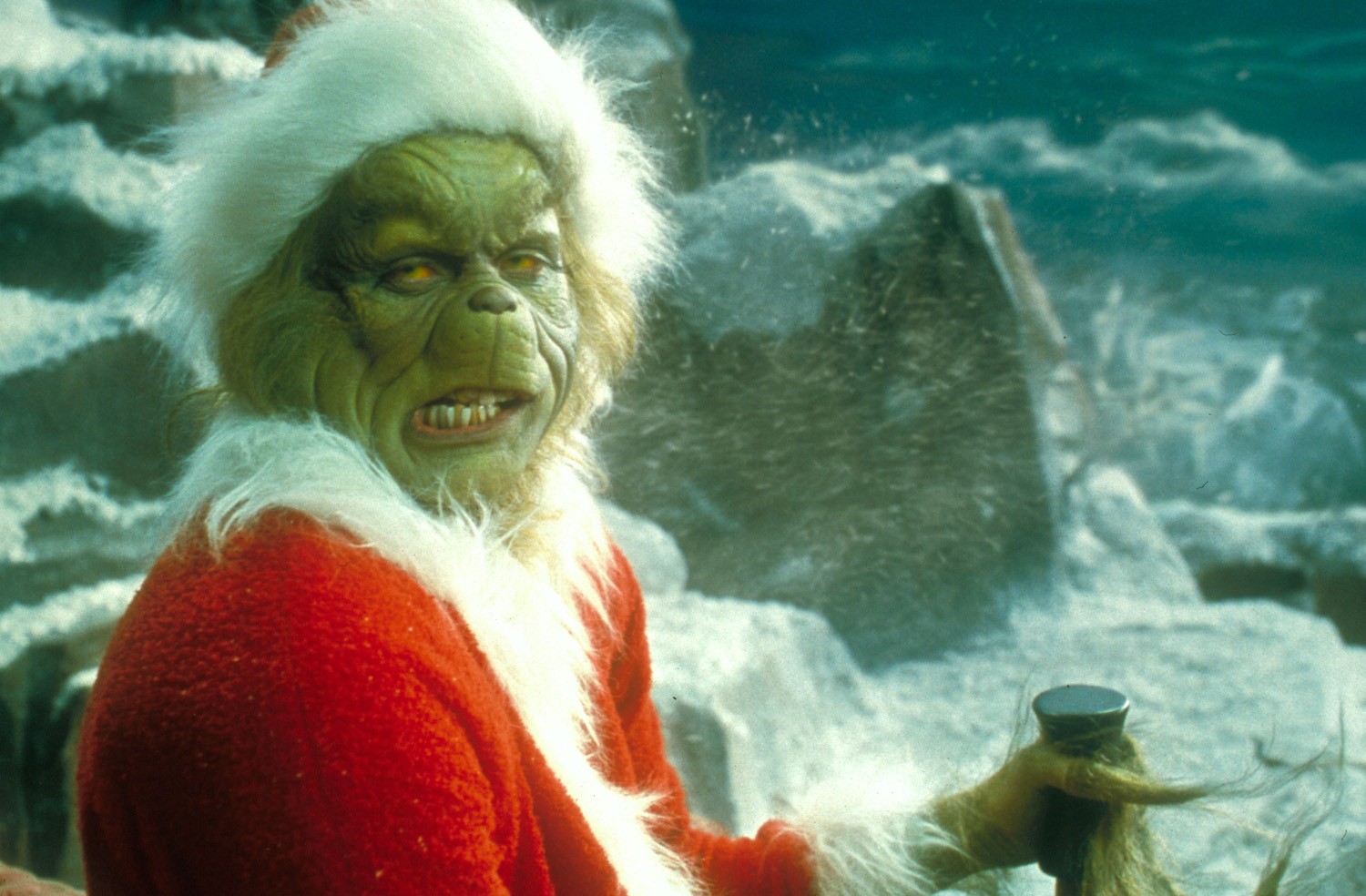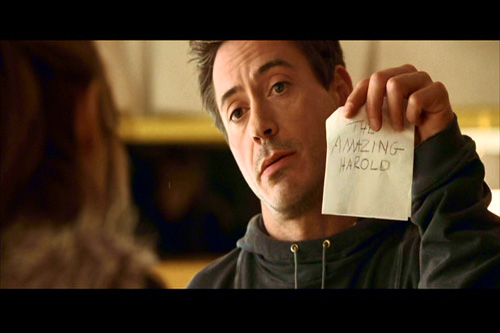After participating in my usual Die Hard-ing on Christmas, I went with my brother Christmas Night to see Django Unchained, my number one movie I've been looking forward to this entire year. I'd previously acquired a copy of the script on my computer, but unlike, Inglourious Basterds, I stopped halfway. The story is indeed, one of a revenge spaghetti western, except set in the south... Largely inspired by the Italian Sergio Corbucci picture Django - even featuring a brief, sort of mantle-turning cameo by Franco Nero, the star of Corbucci's film, as he talks for a short while with Jamie Foxx's Django character.
Django is a free man. He's become a free man by helping kill white people and now that he's a free man, he's going to kill a whole lot more white folk. When we first see him, he has been sold in retaliation for an failed escape with his wife. The two have been separated and now Django will do anything to get her back and rescue his Broomhilda (Kerry Washington).
Why?
Why the fuck does he care for her? My first gripe with the picture is that we don't see any real quality Django and Broomhilda moments. Instead, Washington gets the short end of the stick with her character becoming little more than a damsel in distress, little dimension in her character despite her powerful performance (particularly in a flashback scene where we see the initial consequences of Django and Broomhilda's escape attempt) making her a human MacGuffin. There's nothing really to make us feel the connection between them, save for a fairytale used as an allegory in the picture. Django may care, but I can see why an audience wouldn't.
Then, while slave Django is being moved about by his new owners, suddenly a dentist/bounty hunter Dr. King Schulz (an always charming Christoph Waltz) who kills his captors, frees him, mentors him and then helps him to go to grab his wife. This is looking a lot like the black man's supposed to be the star, but the white man has to save him and I'm starting to think Spike Lee, beside his douchebaggery, is absolutely right in his pre-emptive criticism of the movie's concept.
Of course, there does come a point in the picture when Django is given his chance to be the star and Jamie Foxx pulls it off with flying colors, but at that point, the film feels overtime and the two other leads are gone from out eyes. The final act of the film is basically a problem of pacing and fluidity, but it still somewhat delivers what the movie promised at the beginning, so at some point it can be forgiven. I don't know if this is meant to be present as a flaw because the master Sally Menke has now sadly died in 2010, before she could participate in this movie or if Tarantino seriously just wrote himself into a corner for once and did not know how to get out. Either way, the film has its notable downfalls in editing and writing, both a first for a Tarantino film to me.
The acting, though: fantastic! Tarantino always knows how to pick his actors, for, as much as I was disappointed that the slated Sacha Baron Cohen, Kurt Russell, Anthony LaPaglia, Michael K. Williams and Joseph Gordon-Levitt were not in the final product for different reasons, we got fantastic performances from Jamie Foxx (who I usually don't like - with the exception of Collateral), Kerry Washington (again doing her best with what she's given), Franco Nero's cameo, Walton Goggins, Don Johnson, Laura Cayouette and James Remar (playing two separate characters).
In reaction, we get true scene-stealing performances from Waltz - who plays with Tarantino's dialogue so fabulously, Leonardo DiCaprio - who is hit and miss with me as of recent, but really made a statement with his deviously charming, yet depressingly simple Calvin Candie, and a surprisingly Oscar-worthy performance (though I really hope he doesn't win) as the self-serving Stephen by Samuel L. Jackson.
 |
| I just love this still of Candie. |
My reasoning for not wanting Samuel L. Jackson is actually pretty harsh. He plays probably the most evil character in the picture, way worse than Candie, as horrifying as Candie is. He's, for lack of a better word, a house nigger in this film. He's probably the closest thing Candie has to a confidant and yet, while it seems like he's an Uncle Tom in the vein of Uncle Ruckus in the Boondocks, which is a fantastic show and I'm certain Tarantino was inspired somewhat by MacGruder's work, it's clear at points that Stephen is hiding things from Candie and his sister. He doesn't like them, and he doesn't give a shit about his fellow man, he is only out for what good for him.
 |
| Picture: Mister Ruckus from the Boondocks |
 |
| Picture: Stephen from Django Unchained |
Still Stephen hilarious and frightening at the same time. I saw the film with a majority of an Afro-American audience and they all kept cracking up with Stephen, but it was also clear they all wanted him to die. They were laughing at him, not with him. I find that the perfect way to treat Candie and Stephen as villains. Their ignorance is both disheartening and hilarious.
Candie, though, his horrors are more straightforward right there in your eyes. And the only way Django can keep his cover is to be just as horrible as dishonorable as Candie does not realize he is. In fact, there is one scene, which I'd rather not go into detail so as not to spoil, where Django is almost completely dislikable for calling Candie's bluff of atrocity. But it passes and it comes back to bite the characters.
Candie's a man of honor without the honor. And DiCaprio really brings that out. He doesn't know a damn good thing, he doesn't do a damn good thing and he doesn't like a damn good thing.
But the main point to remember in this film is to get the same mindset as the Michael Bay mindset.
The 'fuck it, it's entertainment' mindset.
This film is one of the more rewarding pictures with that mindset because you are both somewhat enlightened and still a hell of a show is given with the shootouts. The climax is an intense piece of work and the violence beforehand is a real shocking instigator leading into this great climax of a firefight.
What might help is the always awesome on Tarantino's part soundtrack, majorly featuring hip hop songs written specifically for the movie. The Ennio Morricone work was fabulous and since I'm in love with Morricone's work I'm going to listen to it every chance I get, but '100 Black Coffins' and the song played during the climactic shootout - an epic mashup of James Brown and 2Pac - really fucking pumped me up... I tried listening to them on ITunes afterward and I simply can't do it without the imagery the movies provided now.
It's not Inglourious Basterds, it simply is not. It's not going to have a barrels and barrels of substance and subtext in it to analyze and love it some more as a masterpiece of cinema. But it's in a unique position to give a subcultural look towards slavery in the South and critique and the movie sort of does that when it feel the critique is called for - and with great humor. The scene where Don Johnson's character Big Daddy tries to explain to his female slave how to treat Django as a free man and yet still looks down on him is a hilarious yet harsh look on racial feelings in the south at the time.
'You want me to treat him like a white man?'
'No.'
I'm sorry, the dialogue does not say it at all, it's Johnson's delivery of that line that says it all. That one 'No'.
The scene where the Regulators are arguing about the masks, the whole emasculation of what is to become the Ku Klux Klan just from a simple argument and deconstruction via a bunch of guys bitching about bags and masks.
Above all, my favorite instance of this, the one I laughed hardest at, and yet in a theater full of Afro-Americans, I felt depressed that nobody saw how the tables were turned with this...
Candie's lawyer goes into detail about his history with the family, how it parallels his own life and then states with pride 'One could say I was born to be his lawyer.'
And Django just straight tells him 'One could say you was born to be a nigger.'.
It's a moment that nearly ruins everything, but it slides. It didn't slide with me. Django was going to take all these people who took by force. And he was going to do it with his own force.
It's my least favorite Tarantino flick for its flaws, but it's still a great flick that I love and that I'll see again and again and I recommend it again and again. It's funny, it's shocking, it's edgy. The usual Tarantino trademarks are, for the most part absent, but it's still got the feel of a Tarantino flick and you're going to get what you came for if you came for a fucking Tarantino flick. So enjoy it.
 |
| Also, he doesn't get to say Dead Nigger Storage this time. Just Blackie. |
This final part I put at the end of an article because it contains large spoilers that you may rather see the movie first before learning, so yeah, feel free to leave now if you haven't seen it.
This part will just be musing over a very subliminal character arc I found joy in discovering, however short-lived that character was.
So, check it out. Schultz, in the scene I pictured above, essentially had to push Django to collect a bounty while the bounty's son is present to witness the death. How does he do this? By reading the man's bounty poster to Django, explaining what he had done, regardless of who he is now. He introduced an apathy toward human life that is supposed to keep Django alive in the profession the two have taken up...
Fast-forward to one of the harshest-scenes in the movie... Candie is about to feed one of his slaves to his dogs alive. Schultz does not want this to happen, so he offers to pay for the slave, but Django, in his guise as a Mandingo Slaver, refuses to allow Schultz to buy the slave, keeping Schultz from breaking their cover - but at the unfortunate cost of poor D'Artagnan's life.
Fast-forward to Candie's seeming victory over our heroes, having forced Schultz to pay $12,000 for Broomhilda. Schultz is not so much worried about losing, although that does bother him, so much as the slave's fate haunting him. He makes a scene briefly and then insults Candie's self-proclaimed but unvalued Francophilia, before starting to leave with Django and Broomhilda.
Candie insists that Schultz must shake Candie's hand in order for the transaction to be complete as per Southern tradition, but Schultz refuses on the moral reprehensiveness that Candie represents. When all else fails, Schultz just kills Candie leading to his own death by Butch (one of Remar's roles) before the very epic shootout between Django and the enforcers in Candieland.
I found that arc interesting because it meant that what had to save Django's life, as much as it clearly pained our two heroes to witness D'Artagnan's torturous death, was the same thing that killed Schultz, his sudden value of a human life and how he regretted the casualties he once took an apathy to.
One could say that Django gained that apathy, but I'd say it was solely in the heat of the moment the same way he killed the Brittle brothers. Django, later on is seen grasping his handgun in its holster at every moment where Candie showcases his primeval mindset of treatment towards others, and the only reason he probably didn't do it there was that Candie was right there, staring him in the eye while D'Artagnan died. They had to have that staring contest or Django would've blown his cover.
It's sacrifices like that, sacrifice of his own life for honor when talking about Schultz and sacrifice of his own pain - the same pain he begged the Brittles to bring unto himself rather than unto Broomhilda - for his love when talking about Django, that really made the two out to be empathetic heroes of the Spaghetti Western genre.
Damn.










